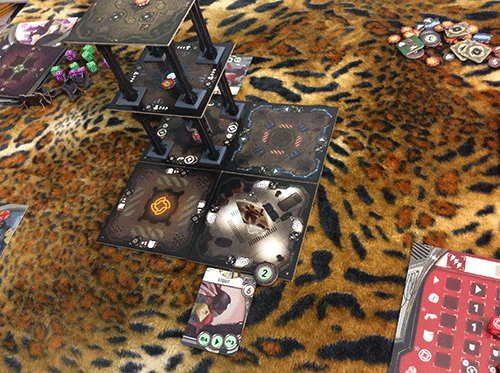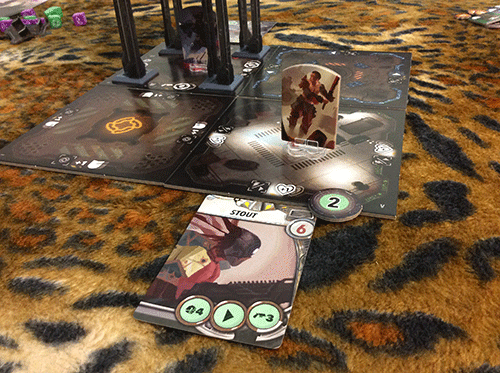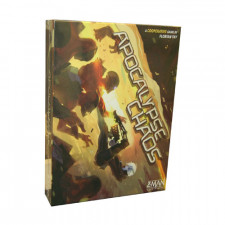Apocalypse Chaos Review
on May 24, 2016
Apocalypse Chaos is a cooperative, dice-driven base defense game for 1-4 players. Usually, I'll try to come up with something witty to say here, but AC is giving me nothing. It has some unique ideas and rehashes some classic ones, and it offers a strong challenge for cooperative groups to master, but the overall experience is so mysteriously bland that it's a struggle to find anything to say about it at all.
Even at the level of the title, it's like they threw a bunch of exciting-sounding words into a hat and picked two at random. The "Chaos" part fits, at least, although this is primarily a game of long, quiet deliberation as everybody around the table tries to make sense of the web of projected enemy movements and attacks. But the "Apocalypse" bit is pure balderdash; the actual story is nothing more than your standard crash-landed-on-a-hostile-alien-planet trope.
The anime-inspired artwork consistently hits that "cool" factor, and the gimmick of a multi-level game board (some of the square tiles are lifted above the rest by plastic support struts) creates visual appeal.

Like Ghost Stories, AC doesn't bother naming its characters (I call them Molly Millions, Shirtless Space Samurai, Token Black Space Marine, and D0g, because the green hero is literally D0g from Half Life 2). Nor is that the only similarity: Apocalypse Chaos also has a modular board made up of random square tiles, each with its own special ability; enemies that appear around the edges of the board and can be attacked from adjacent squares; and a "kill all of the random bosses in the deck" end goal. It's not a direct copy by any means, but the similarities are strong enough to make the comparison worthwhile. For instance, if you thought Ghost Stories was too hard, you won't find AC any nicer.
AC's basic game is mostly about survival. Each round, new enemies warp in through the numbered vortices. Each player then rolls the 5 custom dice matching her character's color, creating a pool of potential actions for that round. Depending on the symbol rolled, the dice will either power your melee or ranged attack, provide points of defense, activate your special ability, provide movement points, or change your character's initiative, deciding the order heroes and enemies act.
The number of dice allocated to an action determines its magnitude, which may change from hero to hero: some heroes punch harder, doing more damage with the same number of dice, while others specialize in shooting, movement or defense. You may also roll a star, a semi-wild symbol that can be used to power either of a hero's two favored skills. Because you have to allocate all your dice before anything actually happens, you must think carefully about where enemies will be attacking and where they'll end their turn as they move around the edges—nothing's worse than building a huge melee attack and realizing, when your initiative comes up, you have nothing to hit.
Once you've got your space legs with the Introductory Mode, you can switch to Apocalypse Chaos's seven-part Campaign Mode, which sweeps you up in a high-octane, thrill-a-minute storyline populated by memorable characters like "Blue Hero," "Red Hero," "Scientist" and "Sternploeeg." The Force Awakens this isn't, but there's a good variety of objectives and gameplay twists to see here.

Unusually for this kind of symbol-matching dice game, Apocalypse Chaos allows no rerolling, which actually decreases the perceived luck factor. Apocalypse Chaos turns every bad roll into an optimization puzzle: using only the symbols you've been given, how can you make a dent in the enemy's defenses and avoid the worst of their attacks, living to fight another day? The more players, the more enemies and options the players need to consider. Each round, you may give and/or receive up to two dice, making sure they end up where they'll have the biggest impact. You can also mitigate bad rolls by using them to activate room abilities or stacking two identical symbols to create a wild. If all else fails, you can allocate useless dice to the external support pool for some piddling AOE damage.
Solving this puzzle round by round makes for an intriguing cooperative discussion and gives Apocalypse Chaos its unique identity. With all the variables in play, there's enough complexity to occupy the full complement of brains around the table. However, a turd can only be polished so shiny, and some rolls are just bad. It's Ghost Stories all over again: the game's high difficulty margin demands a perfection that the die-rolls don't always deliver, and a single bad turn can throw the whole game. Unlike co-op gems like Space Alert and Mage Knight, these puzzles don't always come with a solution.

 Customer Support
Customer Support  Subscribe
Subscribe 




 Account
Account  Wishlist
Wishlist 

